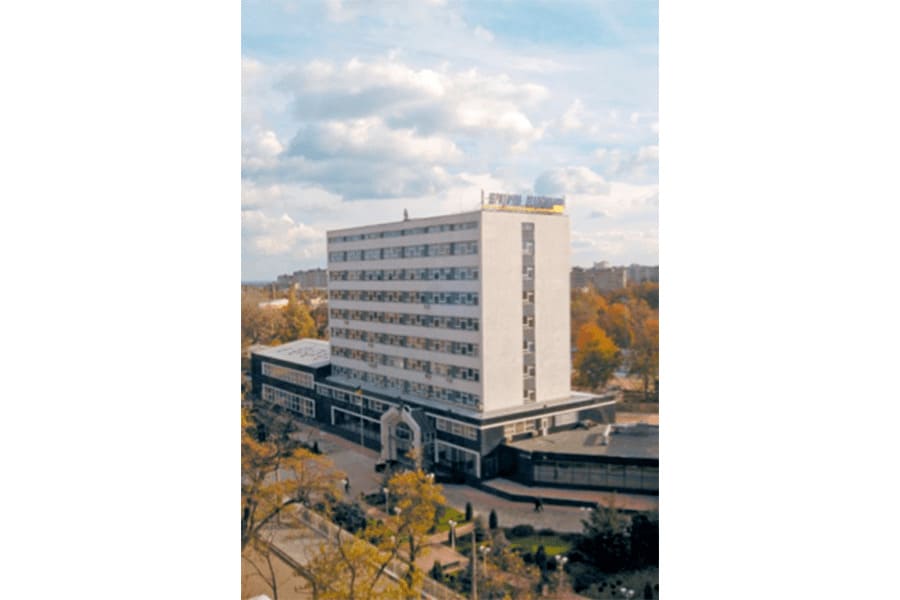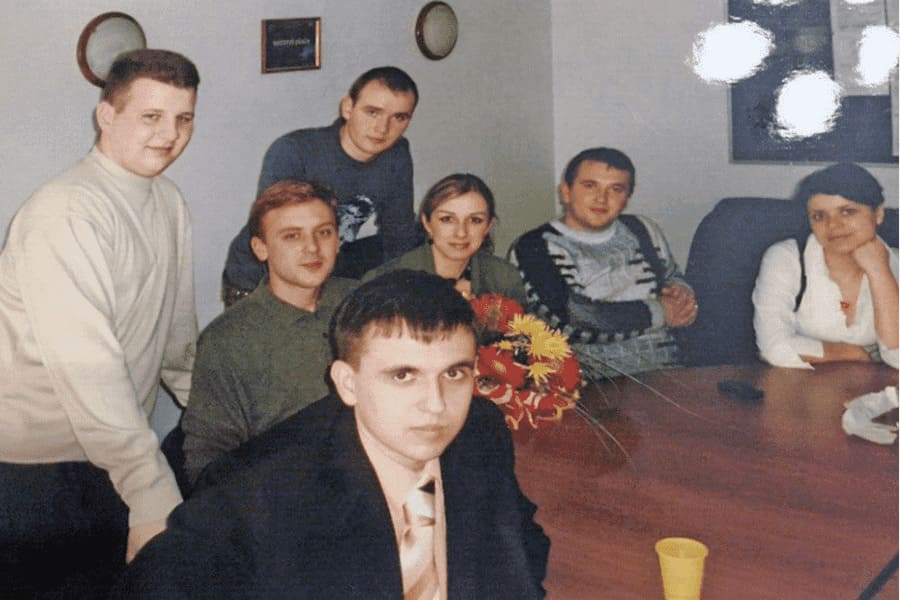
In January 1998, Odesa State Academy of Law, now an independent higher educational institution, continued its journey in shaping the legal elite of the state and embarked on an epoch-making path with three faculties, namely, the Faculty of Public Administration and International Legal Relations; the Faculty of Civil Law and Entrepreneurship; and the Faculty of Judicial and Prosecutorial Studies. In its early years, the faculties included 21 academic departments.
During this period, while adopting and improving upon the traditions of past decades, Odesa State Academy of Law implemented a global educational and scientific strategy aimed at forming a true legal elite in Ukraine – highly qualified specialists in all areas of the state-legal system.
An important aspect of the academy's development was its aspiration for deep European integration, its desire to join the unified educational space of Europe. As early as 1998, Odesa State Academy of Law became an equal member of the Association of European Universities, which provided annual consultative assistance on improving higher education management. In 1999, cooperation was initiated with the International Research & Exchanges Board (IREX), the American Councils for International Education, the British Council, the British Government's Know-How Fund, the International Exchange Center for Science and Technology (IEAC), the TEMPUS program, the Renaissance Foundation, and the International Committee of the Red Cross representation in Ukraine. These collaborations allowed Odesa Academy of Law to expand its international cooperation, sending students for study and internships at European universities and institutions, hosting foreign professors and students, and implementing joint projects of pan-European and international significance.
At the domestic level, Odesa Academy of Law continued to develop and improve its infrastructure. The institution's vanguard consisted of its first faculty and administrative team, led by Rector Sergiy Vasylovych Kivalov and Vice-Rectors Yuriy Yevhenovych Polyanskyi, Anatoliy Ivanovych Pankov, Marko Pylypovych Orzikh, Mykola Petrovych Volyk, Ihor Volodymyrovych Postika, and Viktor Fedorovych Myshakin.
As Sergiy Kivalov, now President of the National University 'Odesa Law Academy,' recalls, he was impressed by the enthusiasm and ideological inspiration of the students and staff of the newly established university. After relocating to the fire-damaged building of the former Higher Vocational Technical School No. 1, the team dedicated their mornings to academic activities. By the afternoon, they changed into makeshift construction brigades. Students and staff personally renovated classrooms, painted walls, and welded pipes for heating. Their goal was clear – to become the best educational institution in Ukraine, and they pursued it relentlessly.
A library is the heart of any European higher education institution. Thus, one of the first large-scale projects undertaken by the administration of Odesa Law Academy was the creation of an advanced scientific library. Established on the grounds of the First State Children's Town in Odesa, the scientific library of Odesa Law Academy had, by 2003, amassed over 500,000 scientific and journalistic publications, serving more than 12,000 readers. Additionally, Odesa Law Academy's library was among the first in Ukraine to be equipped with powerful computers connected to the Internet, enabling students to access legal information databases, utilize web libraries from different countries, and conduct joint scientific and methodological work with other educational centers.
To reinforce the theoretical knowledge acquired during classes, a Legal Clinic began its work in February 1998. Under staff supervision, students provided free legal consultations to low-income populations. They not only offered oral legal advice, but also drafted legal documents such as lawsuits, statements, complaints, and receipts.
By August 1998, a specialized law college had been established within the university to train professionals with an incomplete higher education in the field of 'Law,' awarding them the qualification of junior specialists based on secondary education. Through early career orientation and strict discipline, students of the law college became true legal professionals with high professional and moral standards within three years. In other words, upon reaching adulthood, graduates of the law college were able to work in courts, prosecutor's offices, police, and other institutions, while their peers were only beginning university studies.
By 2002, following the European model, Ukraine's first Institute for the Training of Professional Judges was established at Odesa National Law Academy. This structural unit prepared highly qualified professionals for the judiciary, while also enhancing the qualifications and retraining of judges.

2002. Rector of ONLA Sergiy Kivalov together with the first director of the Legal Vocational College, Stanislav Podlinev, and students.

2002. The beginning of the construction of the first Church of Saint Martyr Tatiana in Ukraine.
A significant milestone in the spiritual education of students at Odesa National Law Academy was the commencement of the construction of Ukraine's first student church – St. Martyr Tatiana's Church. This church not only serves as the patroness of students but also symbolizes the greatness of spirituality and courage for the younger generation. The existence of a student church within a university is a tradition dating back two hundred years, originating in Richelieu Lyceum.
In May 2000, the Metropolitan of Odesa and Izmail designated the future site of the church, where the first stone of its foundation was laid. This momentous event was not only a symbol of faith but also a step toward addressing spiritual needs and establishing the university as an educational and spiritual institution.
To extend the best traditions of Odesa School of Law beyond Southern Ukraine, Odesa Law Academy began establishing educational centers and institutes in other cities. In 1998, the Mykolaiv Educational Center of Odesa Law Academy was opened on the basis of Mykolaiv Evening Law College, followed by the Kryvyi Rih Educational Center, Nikopol Faculty of Odesa State Law Academy, and Cherkasy Educational Center, which, by 2007, had the highest popularity among regional applicants (enrolling over 700 students); and the Training and Consultation Center with a Law College in Chernivtsi.
Later, combining regional needs for legal professionals with international cooperation, Odesa Law Academy officially opened its branch in the Republic of Bulgaria. In October 2003, the branch was relocated to the country's capital, Sofia following a decision by the city council on October 13, 2003, to provide administrative and educational facilities for its activities.

2001. Members of the Student Council of Odesa National Law Academy. Among them are Yevhenii Khizhniak and Denys Kolodin – future deans of the Faculty of Advocacy and the Faculty of Civil and Economic Justice, respectively.
Students are the heart of any university. In 2001, the Scientific Society of Young Scientists, Postgraduates, and Students of Odesa National Law Academy was revived. It organized student research activities, facilitated inter-university and international scientific cooperation, and published outstanding student research papers and conference materials.
Additionally, the university saw increased activity from its Student Council, which organized extracurricular events such as concerts, hiking trips, book clubs, charity fairs, movie nights, excursions, sports competitions, and much more.
In the constant evolution of Ukrainian educational culture, Odesa State Academy of Law reached great heights in the realm of knowledge. Holding a leading position within the national education system, the academy established itself as a prestigious institution among higher educational establishments specializing in law. Therefore, by Presidential Decree No. 601/2000 of April 20, 2000, in recognition of the significant contribution of Odesa State Academy of Law to the development of national higher education and legal science, and taking into account the nationwide and international recognition of its achievements, national status was granted and the academy was henceforth named — Odesa National Academy of Law. This event marked a new chapter in the institution's history of higher education.
It is worth noting that this decree was issued by President of Ukraine Leonid Kuchma following multiple personal visits to Odesa State Academy of Law.
Thus, the years 1998–2003 marked a new era in the history of domestic legal education and Odesa School of Law in particular. However, Odesa National Academy of Law, having set a high pace of development and expansion, did not intend to stop. Instead, it continued to move forward, pursuing a single goal – to become the best higher educational institution not only in Ukraine, but also in Europe.
For his significant contribution to the development of legal science and the state as a whole, the founder and rector of Odesa National Academy of Law, Sergiy Kivalov, was awarded numerous departmental, state, and international honors during this period. Among the most notable distinctions were The Order of Merit III Class (1997), II Class (1999), and I Class (2002); The Order of Prince Yaroslav the Wise V Class (2004) and IV Class (2011); The Honored Lawyer of Ukraine badge (1998).